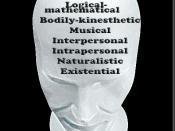Piaget vs. Gardner
Which view do you think best describes childhood intelligence - Piaget's view or the Nature verses Nurture discussion or Gardener's multiple intelligences? Explain your answer.
When considering intelligence, Piaget focuses on the mental processes that occur, rather than on the actual measure of the intellect. He uses four areas to define intelligence where Gardner defines eight. For Piaget these areas are a biological approach to looking at intelligence, the succession of the stages, knowledge, and intellectual competence (Vander Zanden, 2003).
Piaget's biological approach, or biological adaptation, focuses on the physical and mental aspects of our bodies. This includes our reflexes, which occur when certain stimuli trigger an instinctive response. He also discusses how we adapt to certain situations using assimilation and accommodation. Assimilation occurs when new information is introduced to a person. The person begins to integrate the new information into existing files, or "schema". Accommodation occurs when the person reorganizes schema to accommodate him or herself with the environment (Vander Zanden, 2003).
The succession of stages involves the movement through four stages that Piaget has set and defined. Children must move through these stages during their childhood. These include Sensorimotor, Preoperational, Concrete operational, and Formal operational (Vander Zanden, 2003). Stage movement is an important factor of Piaget's definition of intelligence, because Piaget states there are a specific set of criteria that must be met and mastered at each stage. In order to move from the first stage to the next, the child must master that specific set of criteria (Vander Zanden, 2003).
To define Intellectual Competence, Piaget focuses on the highest level of functioning that can occur at a specific stage. Although Piaget has approximate ages assigned to stages, a child's competence is only measured by what stage they are in, not by age. If...


